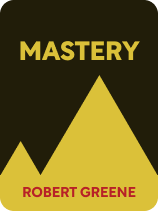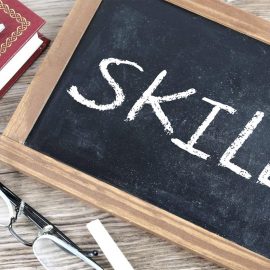

This article is an excerpt from the Shortform book guide to "Mastery" by Robert Greene. Shortform has the world's best summaries and analyses of books you should be reading.
Like this article? Sign up for a free trial here.
When you embark on the path of mastery, what should you pack in your suitcase? What mindset do you need? What must you understand and accept?
George Leonard spent years as a student and teacher of two disciplines: flying jets and practicing aikido (a Japanese martial art known for its subtle complexities). He wrote Mastery, originally published in 1991, to share the expertise he gained in these pursuits.
Read on to learn how to become a master of your chosen skill, craft, or art.
#1: Change for Good
In his first piece of advice on how to become a master of your discipline, Leonard points out that it’s important to achieve lasting change in your lifestyle. After all, to walk the master’s path is no small commitment and will require you to prioritize your chosen skill over many other things. But, lasting change doesn’t come easy. We all hesitate, stumble, and often fall when trying to change our habits, behaviors, or ways of living. We all slide backward as we try to change.
This happens because, Leonard explains, the human body and mind strive to maintain homeostasis—your natural balance of energy and effort—every day. When you try to change, your body and mind sense that something different is happening, and they generate resistance to get you to settle back into your normal patterns.
For instance, you may have tried to build a habit of getting to the gym or waking up early (or both), and soon after slipped back into an old pattern of sleeping in or finding excuses not to do as you’d planned. That’s just your natural physiological systems demanding that you make no significant changes to the established balances—not a lack of willpower or moral fortitude.
(Shortform note: Recent studies in neuroscience lend support to the idea that the human brain and body naturally resist changes to habitual behaviors as a means of maintaining homeostasis. The basal ganglia, a set of neural structures involved in habit formation, actively work to reinforce well-worn behavioral pathways, making it physically challenging to break routines or form new habits. Fortunately, the ganglia will also adapt to active efforts to learn new behaviors, and the research shows that patient, incremental development of habits is perhaps our best shot at changing how we behave.)
Overcome Inertia
According to Leonard, change, then, requires that you overcome the inertia of homeostasis and leverage your willpower to shift your body and mind into a new balance. He explains that this balance comes only when you can stick to a habit long enough that your body and mind adapt to the new efforts or exertions, while also acknowledging that resistance and not pushing so hard that you hurt yourself. In other words, Leonard says, you need to:
- Anticipate that resistance will arise and prepare for it,
- Listen to that resistance to learn what’s difficult for your body and mind, and
- Push gently yet firmly through those challenges until the change sticks.
(Shortform note: Since willpower is the main tool you’ll use to change your behaviors, it’s important to properly understand it. Kelly McGonigal explains in The Willpower Instinct that we have two minds: One that wants what feels good now, and one that tries to keep us focused on our long-term goals. To properly use your willpower is to understand what influences the short-term mind and respond in a way that strengthens your long-term focus. For instance, willpower is strongest in the morning but gets depleted by distractions and decisions—so you can improve your willpower later in the day by having a planned routine that minimizes distractions and choices you have to make.)
Leonard adds that it’s important to be consistent in your practice and remain committed to the change you want to make. By doing so, you’ll eventually change your natural balance; you’ll teach your body and mind to incorporate the new daily effort you’re making—whether it’s a morning run, a daily yoga session, or a commitment to cook healthy dinners each day.
(Shortform note: Research shows that on average, it takes 66 days for new habits to form. However, this time can vary depending on the difficulty or complexity of the behavior you’re changing—easy habits, like drinking a glass of water in the morning, can take just a few weeks, while others, like getting to the gym three times a week, can take almost a year. Keep this in mind when you’re changing your behavior, and give yourself the time and self-support to successfully work through the inertia of your existing behaviors.)
#2: Generate Boundless Energy
If you don’t have the energy to change, you won’t be able to stick to the path long enough to build a steady, committed practice. For this reason, Leonard explains that any aspiring master must learn to release the huge, untapped stores of energy that we all have within.
Throughout life, Leonard argues, we’re conditioned by social expectations and mores to repress large parts of our personalities, and this effectively shuts off our expansive, energetic nature. We learn to quiet down, fit in, and not rock the boat. Unfortunately, this also tends to make us lethargic and depressed.
Leonard offers four ways to reclaim your lost energy.
Exercise regularly. We gain energy not by resting and storing it up, but by using it. Movement, exertion, and exercise use energy up front but make you more energetic over the long run—so be sure to exercise regularly, even if it’s just to go for a walk.
Emphasize the positives. Positive thinking, Leonard asserts, produces healthier, happier, and more energetic people. This doesn’t mean you should deny the negatives. Instead, acknowledge them first so that you’re at peace with them, and then refocus on what’s positive, uplifting, and energizing.
Embrace your shadow. Though we’ve all repressed large parts of our personalities, Leonard says that we can honor them in order to release large amounts of energy from within. For instance, you might redirect repressed anger or sadness into fuel for art, exercise, or work.
Get clear, get committed. You can’t do everything, but Leonard warns against letting decision paralysis prevent you from doing anything. Pick one thing you feel strongly drawn to and commit to it, letting the rest go. This, Leonard says, will clarify your intent and unleash energy.
#3: Overcome Hindrances
Once you’ve built your energy and understood how to make lasting change, you can prepare for the common obstacles you’ll face along the way. Leonard explains how to overcome a number of these.
When your pursuit of mastery and your livelihood don’t match up, you’ll need to make space in your life for both, Leonard says. Be sure you have enough time by planning out the hours you’ll need for each and sticking to a disciplined work/practice schedule.
Leonard also recommends that, when competition looms large—for instance, if you’re mastering a skill like chess or karate—avoid being over- or under-competitive. In other words, remember that results aren’t the point, but don’t phone it in either—competing with spirit will help you understand how far you’ve come, as well as how much more you have to learn.
Leonard says that, when unproductive personality traits arise—such as laziness, ego, overseriousness, or perfectionism—try to let go and remember the humor in all things. Take heart, find opportunities to laugh and relax, and avoid becoming too self-important.
Finally, when you get injured, which Leonard says is likely to happen in most physical disciplines, give yourself the grace to rest and heal. To prevent injuries, remember to balance hard work with an awareness of your body’s limits and pain points.
#4: Master Everyday Life
We’ll touch on Leonard’s advice for perhaps the most direct way to get on the master’s path—mastering the mundane, everyday aspects of your life.
Everyday life, Leonard says, is full of opportunities to practice as the master would. The only reason we don’t approach these activities as such—from folding the laundry to maintaining your car or relating to your loved ones—is because we’ve been conditioned to seek the end goal. According to Leonard, we live in a “getting things done” culture, with an emphasis on done. We do things, not for their own sakes, but to get them over with.
According to Leonard, if you want to live a rich and fulfilling life, the “getting things done” mindset is the wrong way to go about things. He says that we should instead seek to cultivate the master’s attitude in all of these mundane, intermittent moments of life. To do this, take the following steps:
1) Start from a relaxed presence. Before beginning to, say, fold the laundry, take a moment to compose yourself for the task ahead.
2) Fully immerse yourself in the activity at hand. In other words, maintain that presence from which you started in each moment of the activity. Pick up and fold each new article of clothing with a calm, diligent focus on that task, striving for excellence and elegance in each minute aspect of the activity.
3) Forget about the end goal. The master practices not to achieve a result but for the sake of the activity itself. Paradoxically, Leonard says that this often improves the result, since you’ll be more dedicated to patient, quality performance of the activity.
Leonard says you can cultivate the master’s attitude in all the mundane aspects of life—everything from driving to work to cooking dinner, cleaning your house, or tucking your kids into bed each night. Approach these activities with presence and diligence, and you’ll be well on the way to living as a master would in every aspect of your life.

———End of Preview———
Like what you just read? Read the rest of the world's best book summary and analysis of Robert Greene's "Mastery" at Shortform.
Here's what you'll find in our full Mastery summary:
- How to walk the path of the master by being disciplined in your skill or art
- Why mastery isn't an end goal, but rather a continual process of learning
- Why the master's path is the only guaranteed way to live a fulfilling life






